Items filtered by date: May 2023
A Tell-Tale Symptom of Flat Feet
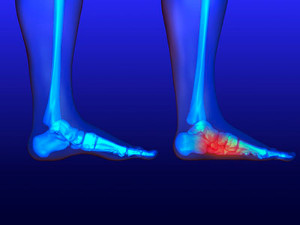
Flat feet are a common foot ailment that can be easy to observe. While standing up, does the entire foot lie flat on the floor? Most babies are born with flat feet, and the arch generally develops by the teenage years. This may not be the case for some adults, as genetics may contribute to having flat feet. Additionally, if a foot injury has occurred, flat feet may be the result. Many people do not experience pain with flat feet and can complete daily activities. Conversely, flat feet may cause pain and discomfort, and measures can be implemented to help reduce existing pain. These can include performing specific stretches that are tailored for patients with flat feet, in addition to wearing custom-made orthotics. If you have flat feet, it is strongly suggested that you are under the care of a podiatrist who can monitor your balance and general foot health.
Flatfoot is a condition many people suffer from. If you have flat feet, contact Dr. Ronald Sheppard from Warren-Watchung Podiatry Center. Our doctor will treat your foot and ankle needs.
What Are Flat Feet?
Flatfoot is a condition in which the arch of the foot is depressed and the sole of the foot is almost completely in contact with the ground. About 20-30% of the population generally has flat feet because their arches never formed during growth.
Conditions & Problems:
Having flat feet makes it difficult to run or walk because of the stress placed on the ankles.
Alignment – The general alignment of your legs can be disrupted, because the ankles move inward which can cause major discomfort.
Knees – If you have complications with your knees, flat feet can be a contributor to arthritis in that area.
Symptoms
- Pain around the heel or arch area
- Trouble standing on the tip toe
- Swelling around the inside of the ankle
- Flat look to one or both feet
- Having your shoes feel uneven when worn
Treatment
If you are experiencing pain and stress on the foot you may weaken the posterior tibial tendon, which runs around the inside of the ankle.
If you have any questions please feel free to contact one of our offices located in Marlboro and Watchung, NJ . We offer the newest diagnostic and treatment technologies for all your foot and ankle needs.
Pregnancy Causes Changes to the Feet
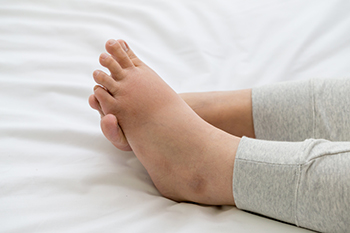
The entire body changes during pregnancy, and the feet are no exception. Many women notice their feet have grown, which may be attributed to pregnancy hormones the body produces. As the pregnancy progresses, the feet may become swollen, and the arches may flatten as additional weight is gained. Relief may be found when shoes that are worn have a low heel and healthy foods are consumed. It is helpful to refrain from eating salty foods, and frequently elevating the feet may reduce the swelling. Swollen feet may also be a symptom of poor circulation, which may happen from the body recirculating extra fluid that is needed by the growing fetus. It is beneficial to stay as active as possible, drink plenty of water daily, and sleep on the left side. If you have additional questions about how pregnancy can affect the feet, it is suggested that you consult with a podiatrist who can address any concerns you may have.
Pregnant women with swollen feet can be treated with a variety of different methods that are readily available. For more information about other cures for swollen feet during pregnancy, consult with Dr. Ronald Sheppard from Warren-Watchung Podiatry Center. Our doctor will attend to all of your foot and ankle needs.
What Foot Problems Can Arise During Pregnancy?
One problem that can occur is overpronation, which occurs when the arch of the foot flattens and tends to roll inward. This can cause pain and discomfort in your heels while you’re walking or even just standing up, trying to support your baby.
Another problem is edema, or swelling in the extremities. This often affects the feet during pregnancy but tends to occur in the later stages.
How Can I Keep My Feet Healthy During Pregnancy?
- Wearing orthotics can provide extra support for the feet and help distribute weight evenly
- Minimize the amount of time spent walking barefoot
- Wear shoes with good arch support
- Wear shoes that allow for good circulation to the feet
- Elevate feet if you experience swelling
- Massage your feet
- Get regular, light exercise, such as walking, to promote blood circulation to the feet
If you have any questions please feel free to contact one of our offices located in Marlboro and Watchung, NJ . We offer the newest diagnostic and treatment technologies for all your foot and ankle needs.
Do Your Child's Feet Hurt?
Symptoms and Causes of Morton’s Neuroma
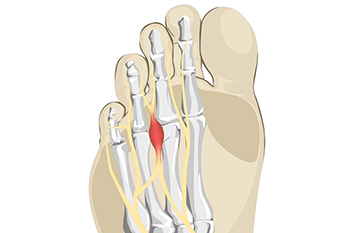
If you experience pain between the third and fourth toes, it may be caused by a condition known as Morton’s neuroma. It is also referred to as interdigital neuroma or plantar neuroma. You may be feeling numbness, burning, or aching in the area. These symptoms are the result of a thickening in tissue that surrounds a nerve near the toes. Morton’s neuroma is frequently experienced by women who wear high-heeled shoes with pointy toes. A frequently reported symptom is the feeling of a lump in the shoe near the ball of the foot. Adding a cushioned shoe insert and giving the foot a quick massage can sometimes alleviate the pain. A tingling sensation between the toes, known as paresthesia, also may develop as the result of Morton’s neuroma. Wearing shoes with a wider toe box can also help alleviate this. However, if the pain in the ball of the foot worsens whenever you put weight on it, it may be time to see a foot doctor for an exam. It is suggested that you make an appointment with a podiatrist who can properly diagnose the cause of the pain and offer treatment options.
Morton’s neuroma is a very uncomfortable condition to live with. If you think you have Morton’s neuroma, contact Dr. Ronald Sheppard of Warren-Watchung Podiatry Center. Our doctor will attend to all of your foot care needs and answer any of your related questions.
Morton’s Neuroma
Morton's neuroma is a painful foot condition that commonly affects the areas between the second and third or third and fourth toe, although other areas of the foot are also susceptible. Morton’s neuroma is caused by an inflamed nerve in the foot that is being squeezed and aggravated by surrounding bones.
What Increases the Chances of Having Morton’s Neuroma?
- Ill-fitting high heels or shoes that add pressure to the toe or foot
- Jogging, running or any sport that involves constant impact to the foot
- Flat feet, bunions, and any other foot deformities
Morton’s neuroma is a very treatable condition. Orthotics and shoe inserts can often be used to alleviate the pain on the forefront of the feet. In more severe cases, corticosteroids can also be prescribed. In order to figure out the best treatment for your neuroma, it’s recommended to seek the care of a podiatrist who can diagnose your condition and provide different treatment options.
If you have any questions, please feel free to contact one of our offices located in Marlboro and Watchung, NJ . We offer the newest diagnostic and treatment technologies for all your foot care needs.
Effective Injury Prevention Stretches for Runners
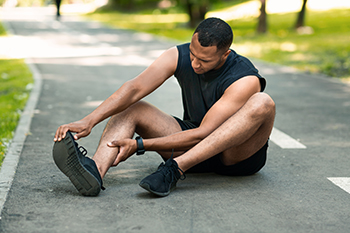
Many people who enjoy running are aware of the need to prevent running injuries. An injury can affect the feet, and can interfere with running enjoyment. There are various types of running, ranging from relieving stress by jogging several minutes per day to training for a marathon. Stretching before and after running is beneficial in injury prevention, and it is worth the few minutes it takes to do this. Calf stretches are easy to perform, and they can help to protect the heel and Achilles tendon. This is done by standing on a step while lowering one heel at a time until a gentle stretch is felt. Performing lateral lunges may help to strengthen the glutes, and this is accomplished by standing up while shifting the weight toward one foot, and allowing the knee to bend. If you would like additional information about various running injury prevention methods, it is suggested that you confer with a podiatrist who can provide you with the knowledge you are seeking.
All runners should take extra precaution when trying to avoid injury. If you have any concerns about your feet, contact Dr. Ronald Sheppard of Warren-Watchung Podiatry Center. Our doctor will treat your foot and ankle needs.
How to Prevent Running Injuries
There are a lot of mistakes a runner can make prior to a workout that can induce injury. A lot of athletes tend to overstretch before running, instead of saving those workouts for a post-run routine. Deep lunges and hand-to-toe hamstring pulls should be performed after a workout instead of during a warmup. Another common mistake is jumping into an intense routine before your body is physically prepared for it. You should try to ease your way into long-distance running instead of forcing yourself to rush into it.
More Tips for Preventing Injury
- Incorporate Strength Training into Workouts - This will help improve the body’s overall athleticism
- Improve and Maintain Your Flexibility – Stretching everyday will help improve overall performance
- “Warm Up” Before Running and “Cool Down” Afterward – A warm up of 5-10 minutes helps get rid of lactic acid in the muscles and prevents delayed muscle soreness
- Cross-Training is Crucial
- Wear Proper Running Shoes
- Have a Formal Gait Analysis – Poor biomechanics can easily cause injury
If you have any questions, please feel free to contact one of our offices located in Marlboro and Watchung, NJ . We offer the newest diagnostic and treatment technologies for all your foot care needs.
What Type of Orthotic Do I Need?
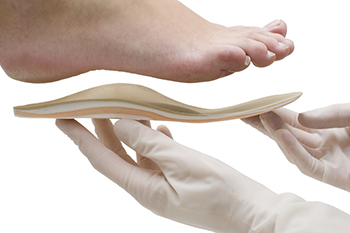
There are specific foot conditions that may benefit from wearing orthotics. These can include flat feet, high arches, and plantar fasciitis. Orthotics are defined as prescribed heel or shoe inserts that are made to treat foot conditions. They generally provide more support in shoes and are available in various shapes and sizes. Custom-made orthotics are known to fall into three categories. Hard materials such as plastic are used to make functional orthotics, and can be durable and long-lasting. They can help to offer support to the foot and improve ankle mobility. Accommodative custom orthotics are made of softer materials, and are generally well-cushioned. They are effective in reducing the stress of standing and walking, and may be chosen for diabetic patients. Orthotics made of both of these types of materials are referred to as semi-rigid. They can be used to treat patients who have arthritic or flat feet. If you have a foot condition that requires orthotics to be worn for maximum improvement, it is suggested that you consult with a podiatrist who can determine what the best type is for you and can create a custom orthotic to meet your foot's specific needs.
If you are having discomfort in your feet and would like to try orthotics, contact Dr. Ronald Sheppard from Warren-Watchung Podiatry Center. Our doctor can provide the care you need to keep you pain-free and on your feet.
What Are Orthotics?
Orthotics are inserts you can place into your shoes to help with a variety of foot problems such as flat feet or foot pain. Orthotics provide relief and comfort for minor foot and heel pain but can’t correct serious biomechanical problems in your feet.
Over-the-Counter Inserts
Orthotics come in a wide variety of over-the-counter inserts that are used to treat foot pain, heel pain, and minor problems. For example, arch supports can be inserted into your shoes to help correct overarched or flat feet, while gel insoles are often used because they provide comfort and relief from foot and heel pain by alleviating pressure.
Prescription Orthotics
If over-the-counter inserts don’t work for you or if you have a more severe foot concern, it is possible to have your podiatrist prescribe custom orthotics. These high-quality inserts are designed to treat problems such as abnormal motion, plantar fasciitis, and severe forms of heel pain. They can even be used to help patients suffering from diabetes by treating foot ulcers and painful calluses and are usually molded to your feet individually, which allows them to provide full support and comfort.
If you are experiencing minor to severe foot or heel pain, it’s recommended to speak with your podiatrist about the possibilities of using orthotics. A podiatrist can determine which type of orthotic is right for you and allow you to take the first steps towards being pain-free.
If you have any questions please contact one of our offices located in Marlboro and Watchung, NJ . We offer the newest diagnostic and treatment technologies for all your foot and ankle needs.

